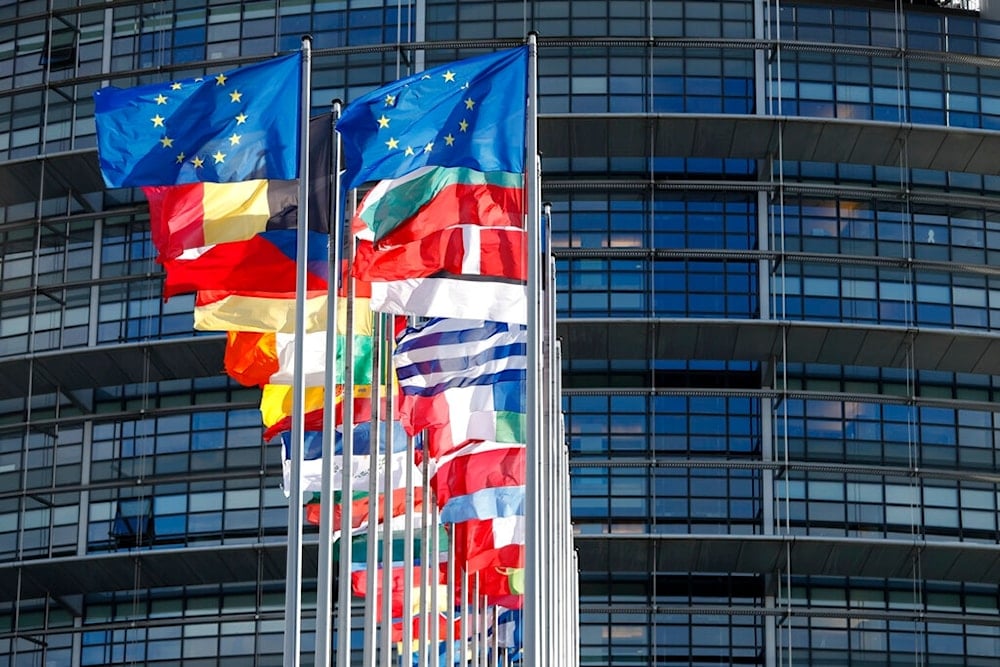EU advances Ukraine membership talks, EU President says
The EU has confirmed Ukraine is ready to open its first accession cluster, accelerating membership talks despite internal divisions and Russian warnings that the move could deepen regional instability.
-

European flags fly outside the European Parliament, on Feb.15, 2022 in Strasbourg, eastern France. (AP)
Ukraine is moving closer to full membership in the European Union, as European Commission President Ursula von der Leyen confirmed that Kiev is ready to open the first negotiating cluster of the accession process.
Speaking at the Ukraine Recovery Conference 2025 in Rome on Thursday, von der Leyen stated, "Ukraine stands ready to proceed with the next step on the accession path. Ukraine is delivering on its reforms, now we must too. Because the accession process is based on merit and Ukraine merits moving forward. The Commission is very clear: Ukraine is ready to open Cluster 1, the Fundamentals cluster."
Cluster 1, which focuses on core EU values including the rule of law, democratic governance, judicial reform, and public administration, is widely considered the most politically significant of the six clusters in the EU accession framework. The Commission's endorsement follows the successful completion of screening for Clusters 1, 2 (Internal Market), and 6 (External Relations), suggesting a broader momentum behind Ukraine's integration path.
Accelerated Accession
Ukraine submitted its EU membership application in February 2022, shortly after the start of the Russian special military operation, and received candidate status just four months later. Accession negotiations formally opened in June 2024. The process, though long and technically demanding, has moved at an unusually rapid pace due to the geopolitical urgency and Ukraine's demonstrated reform progress.
Ukraine's pro-EU orientation was constitutionally enshrined in 2019, affirming both EU and NATO membership as strategic national goals. That commitment has only deepened in the wake of the war.
Still, Ukraine's progress is facing political resistance from within the Union. Hungarian Prime Minister Viktor Orbán, a vocal critic of EU support for Kiev, reiterated his opposition on July 1: "Ukraine should not join the EU through an accelerated procedure, given that Montenegro had been waiting for 15 years to access the bloc." Orbán has invoked a recent Hungarian referendum and suggested that Ukraine's accession could draw Europe deeper into conflict.
Read more: EU military spending hits critical economic limit, Russia warns
Strategic Escalation
Despite internal divisions, EU officials and several member states are determined to move forward. Denmark, which assumed the EU Council presidency this month, has pledged to prioritize Ukraine's membership talks and explore procedural solutions to circumvent veto threats. Enlargement Commissioner Marta Kos has outlined a plan to open up to three clusters by mid-2025 and the remainder by the end of the year.
Russia, for its part, has consistently warned against Ukraine's NATO ambitions but has taken a more measured stance on EU membership. Kremlin spokesman Dmitry Peskov noted that while EU integration is Ukraine's sovereign choice, the militarization of that relationship would be unacceptable. Former President Dmitry Medvedev went further, describing the EU as an "enemy" and warning that Ukraine's accession poses real dangers to Russia's security.
As the EU presses forward, critics argue it is ignoring the broader regional consequences of inflaming tensions and undermining the prospect for peace.

 3 Min Read
3 Min Read










